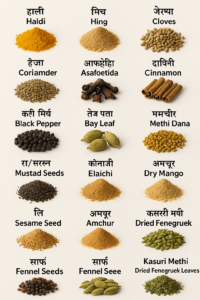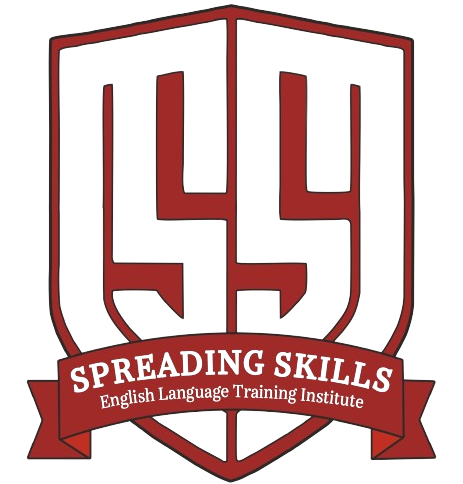Spices names in english
 When we talk about Indian food, the first thing that hits us is the tadka, the aroma, the flavour, and of course – the masale! Every Indian kitchen is incomplete without its stash of colorful, fragrant spices. But ever wondered what these spices are called in English?
When we talk about Indian food, the first thing that hits us is the tadka, the aroma, the flavour, and of course – the masale! Every Indian kitchen is incomplete without its stash of colorful, fragrant spices. But ever wondered what these spices are called in English?
Whether you’re someone who loves cooking, or just trying to explain “jeera” to your firangi friend, this guide is just for you! Let’s break it down in a simple, fun way 👇
🌟 1. Haldi – Turmeric
Haldi is that bright yellow powder our moms swear by – not just in food but even on our wounds! In English, it’s called Turmeric. It adds colour, earthiness, and has loads of health benefits. Golden milk, anyone?
🌶️ 2. Mirch – Red Chili Powder
We Indians love our spice, and Lal Mirch is what gives us that kick. In English, it’s Red Chili Powder. Some like it mild, some go full-on fire alarm mode 😅
🌿 3. Dhaniya – Coriander
Dhaniya is super versatile. You’ll find it in seed form and also powdered. The English name is Coriander. It has a warm, slightly lemony taste that works like magic in curries.
🔥 4. Jeera – Cumin
Cumin seeds are a must for any Indian tadka. In English, we call it Cumin. That sizzling sound when you add jeera to hot oil? Pure music for the soul.
🌱 5. Ajwain – Carom Seeds
Ajwain, or Carom Seeds, are tiny but mighty! Helps in digestion and adds a strong flavour to pooris, pakoras, and parathas.
💨 6. Hing – Asafoetida
This one’s the secret weapon in a lot of Indian dishes. Known as Asafoetida in English, hing has a strong smell, but when cooked, it adds a depth of flavour that’s unbeatable – especially in dals.
🌸 7. Laung – Clove
Tiny buds that smell amazing – Laung or Clove adds warmth and richness to dishes like biryani. Also helps with toothaches. Desi remedy, bro!
🍂 8. Dalchini – Cinnamon
Dalchini is sweet and woody. We call it Cinnamon in English. Goes into gravies, desserts, and even your morning chai!
⚫ 9. Kali Mirch – Black Pepper
If lal mirch is the hero, kali mirch is the classy villain. In English – Black Pepper. Adds that sharp punch without the redness.
🍃 10. Tej Patta – Bay Leaf
Used in pulao, biryani, and curries for that subtle aroma. Bay Leaf in English – and yes, we all forget to take it out while eating 😅
💚 11. Elaichi – Cardamom
Green or black – both types are magical. Known as Cardamom, it’s used in sweets, chai, and even perfumes!
🌾 12. Methi Dana – Fenugreek Seeds
These bitter seeds – Fenugreek – go into pickles and masalas. They’re great for health, especially sugar control.
🟡 13. Sarson/Rai – Mustard Seeds
Tiny black or yellow seeds called Mustard Seeds in English. You know the crackling sound they make in hot oil? That’s the beginning of something delicious.
🖤 14. Kalonji – Nigella Seeds
Also called Nigella Seeds, kalonji is used in pickles, naan, and even salads. Looks like black sesame, tastes totally different.
🌼 15. Saunf – Fennel Seeds
Sweet, cooling, and often eaten after meals. Fennel Seeds help with digestion and give a refreshing touch.
💛 16. Amchur – Dry Mango Powder
If you’re missing that tangy taste, Amchur is the way to go. Called Dry Mango Powder in English, it adds a sour punch to curries and chaats.
❤️ 17. Anardana – Dried Pomegranate Seeds
Anardana is sweet, sour, and makes your dish pop. In English – Dried Pomegranate Seeds.
🟠 18. Kasuri Methi – Dried Fenugreek Leaves
This one’s a secret ingredient in many restaurant-style dishes. Kasuri Methi, or Dried Fenugreek Leaves, adds aroma and richness to gravies and parathas.
💡 Why This Matters?
Knowing the English names of Indian spices is super helpful if you:
-
Live abroad and shop at international stores
-
Want to cook Indian dishes for your foreign friends
-
Or just want to sound smart while teaching someone about Indian cuisine
#IndianSpices #MasalaMagic #DesiKitchen #HindiToEnglish #SpiceNames #IndianCooking101 #DesiSwag #KitchenEssentials #FoodieIndia #SpicesOfIndia
